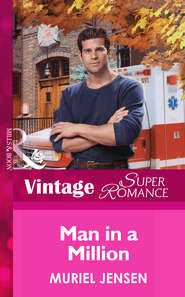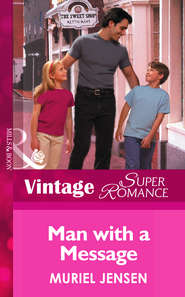По всем вопросам обращайтесь на: info@litportal.ru
(©) 2003-2024.
✖
New Year's Wedding
Автор
Год написания книги
2019
Настройки чтения
Размер шрифта
Высота строк
Поля
“I’m not sure I do. How am I?”
She opened her mouth to answer then fluttered her hands, seemingly at a loss for the right words. “I don’t know. You’re always everybody’s problem-solver.” Then she followed the direction Cassie had taken to the armoire. He took a cup of coffee and fell in behind her, stopping beside Cassie, who stood several feet back, admiring the gift.
He made every effort to mask what he felt. It was the ugliest thing he’d ever seen. It was seven feet high, with doors two-thirds of the way up and two drawers at the bottom. It was painted to look rustic in a flat, medium blue, and was covered in colorful, primitive-style floral designs. It looked like a gaudy weed among his simple furnishings.
His mother asked from the other side of Cassie, “Do you like it?”
He poured coffee down his throat. “It’s wonderful, Mom.” He was grateful she and his aunts hadn’t tried to disconnect his television to put it inside the cabinet. When he’d moved into this place, they’d connected his set while he was helping move in the sofa and, for reasons no one could understand, he got Korean television.
Cassie took a step forward and ran her fingertips over one of the painted flowers. “This is milk paint, isn’t it?” she asked his mother.
“It is. And these are lion-mounted ring pulls, right out of the early nineteenth century. A little much for this piece, but some folk artist might have saved it off a more elegant dresser. I have a small but interesting folk art collection.”
“I love it. It has so much enthusiasm.”
“How long are you staying in Beggar’s Bay?” his mother asked with no attempt to fake politeness despite that civil exchange. She wanted to know when Cassie was leaving.
Cassie seemed to get that but smiled, anyway. “My brother and sister are flying in overnight, so I’m hoping I’ll be able to stay with one of them until I go home.”
His mother seemed appeased. “Good. Well, I should go. I left a casserole in the refrigerator for you for tomorrow’s dinner.”
“Thanks, Mom.” Grady walked her around the front to her car.
“I like the armoire,” he said to his mother’s back.
She turned and gave him a knowing look. “You didn’t like it until you saw that she liked it. And how do we know she didn’t say that just to get in good with us?”
Rain fell in sheets beyond the protection of the overhead deck, and the night air was perfumed and cold. “Mom, that’s paranoid and completely unfair. I’m sure her bank account is fifty times larger than mine. What reason would she have to ingratiate herself with you to get to me?”
In a sudden loosening of her severity, his mother patted his cheek. “Because you’re such a sweetheart and, according to ET, she hasn’t had a lot of luck with men. That meltdown suggests she’s troubled about her life, and you are like a stockade wall.”
A stockade wall. Tall timbers lashed together to form a barrier, their tops hacked to a point to prevent a breach. He wasn’t sure that was flattering.
She gave him a quick, strong hug. “That’s how it felt to me when you came home from school to help me with Dad. Like we were safe behind you.” She pushed him back. “Now, go inside. I won’t bother you again unless you need me. Or want to invite me to dinner, or come over to put up the pergola for me like you’ve been promising.”
“I painted it, didn’t I?”
“Last July. And you did such a lovely job that it should be in my garden and not my garage.” She smiled sweetly then hurried to her car. She took a few minutes to get settled inside, then started to back up.
Grady watched her turn around, keeping a careful eye on his basketball stand; he’d replaced it twice already thanks to her lack of skill in Reverse. He waved her off and ran back inside.
Cassie sat at his breakfast bar, her veil of hair shining under the overhead light, soft, weary blue eyes looking up at him as he walked into the kitchen. She appeared fragile suddenly, not at all the athlete who’d raced across the airport tarmac with him, who’d put up with the chilling rain and his unwelcoming mother.
“You look about to fall asleep,” he said, helping her off the stool. “Come on. I’ll show you to your room then I’ll get your bag.”
“I can get my things,” she said, stifling a yawn. “In my job, sometimes it’s expedient to be waited on. But, here, I can fend for myself.”
“You can do that tomorrow. Tonight you need some sleep.” He pointed her into the foyer and up the stairs.
“You get your hardheadedness from your mother, don’t you?” she asked over her shoulder. “I’m sorry if my being here upset your homecoming. She seemed very disappointed that you weren’t alone. She really doesn’t like me.”
They stepped up onto the fir-wood floor of the bedroom. “She thinks you’re toying with me for selfish purposes. I kind of like the notion, so I didn’t try too hard to set her straight.”
“Grady.”
“Okay, I did try. You’re right, though. She is a hardheaded woman, but that’s helped her a lot in her life. And she’s a great person, when she’s not acting like a mother bear.”
“You’re lucky to have someone care that much about you.” She turned her attention to the room. It was a big space with lodge-style furnishings that looked like they hadn’t been disturbed since they’d been placed. “It’s beautiful up here. Thank you. I’ll try not to get too comfortable.”
He went to the small bath in the corner and reached in to flip on the light. “You might want to get comfortable. I’ve been thinking about Jack’s and Corie’s situations and, much as I’m sure either one would love to have you, Jack and Sarah are in the process of packing to move to a house nearer the assisted-living facility, and Ben’s got a great condo, but it has only two bedrooms, and he’s bringing home two kids—a boy and a girl. So you’d probably end up on the sofa.”
* * *
THAT WAS TRUE. She’d had no choice in Querida but to escape the press or let them intrude upon her reunion with her family. But she made a mental note to remember that even in moments of great distress, she had to plan ahead a little. Every step she’d taken so far would have been off a cliff if it hadn’t been for Grady.
She had to smile. “Your mother would hate that.”
“True, but she’d adjust. Look around, figure out if there’s anything you need that isn’t here, and I’ll go get your bag.”
“Thank you. Grady?” She felt she had to say something about the meltdown. He had to be wondering. “The scene I made that ended up on television and probably all over the internet...”
“Is nobody’s business but yours.”
“I’m not like that—temperamental and hysterical and...”
He grinned. “I don’t know. Yellow M&M’s, only dark, handsome men...”
She gave him credit for the continued calm that so defined him, and that he could joke despite what his mother had revealed about her. “I just didn’t want you to think you ran off with a lunatic.”
“Nothing to worry about. I took off with you because I wanted to. That part’s on me. I’ll get your bag.”
As she heard his footsteps going down the stairs, she tried to shed her worries and focus on the quiet comfort his home offered.
The large room was decidedly masculine. A king-size bed with big pillows and a brown suede bedspread and a simple iron headboard stood against the wall. Rustic wooden bedside tables held brass lamps that looked like lanterns. She went to the triple mirror on the wardrobe door. Inside the closet were four levels of shelving about four feet wide. The other ten feet of closet had nothing in it but a hanging rod with three empty hangers.
She closed the doors then went into the smallish bathroom. It was white with a pedestal sink and a tall cabinet made of planks. It held several white and brown towels, paper products and other supplies.
A walk-in shower with a sliding door looked serviceable. On the wall next to it, clear of furniture, was a two-dimensional, three-foot-wide carving of a pirate ship, sails billowing, Jolly Roger flying. She laughed lightly at that, thinking it seemed out of character with the rest of the house and what she knew of the man who owned it.
“Ben gave that to me.”
She turned at the sound of Grady’s voice.
He stood in the doorway. “On my last birthday. He thought my life needed more adventure.”
If they were in New York, she thought, finding herself completely distracted by him, she could get him modeling jobs. He was the perfect height, had a nice face with interesting planes and angles, and an easy look in his eyes. She could picture the camera’s tight shot of his face. For a Drakkar Noir ad, or one that featured a pair of Ray-Bans slipped down his nose.
She drew herself back to the moment. This wasn’t New York. This was Beggar’s Bay, Oregon, and she had to stop thinking about work.











